- What’s an Inland Beach Vacation?
- Go Go Go
- Shanghai, Xitang, Wuxi
- A Jiangnan Homecoming
- Xian the Ancient Capital
- Xian & Its Glory
- (Other) Foods
- (Muslim Street) Foods
Neither Hong nor I was a fan of Shanghai. However, the city marked a significant step in our relationship, and the region actually contains much of family history for both our families. While an after thought, we turned part of this trip into a mini discovery of our ancestral roots.
A Shanghai Mansion
Up till he was 17, Hong’s dad lived in an apartment near Nanjing West Road. The building and its surrounding neighborhood still stands, sixty years later, and he took us for a visit.
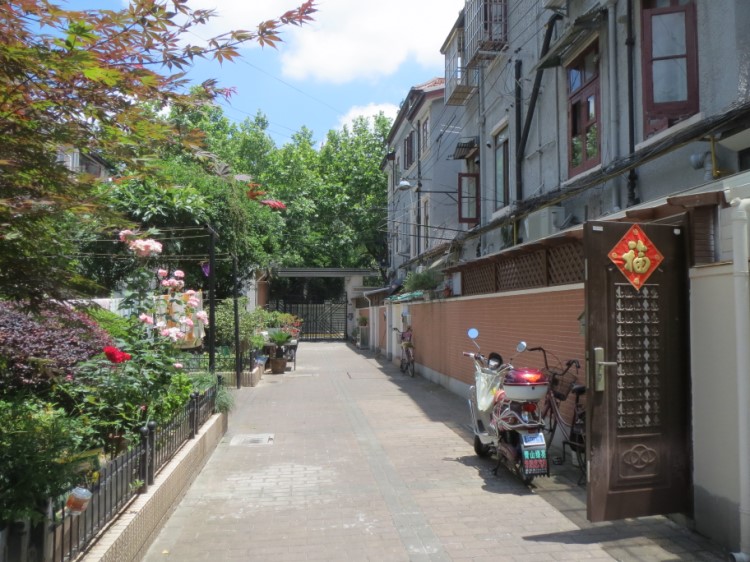
This was sort of a gated community, though the entrance was not locked (at least during the day)
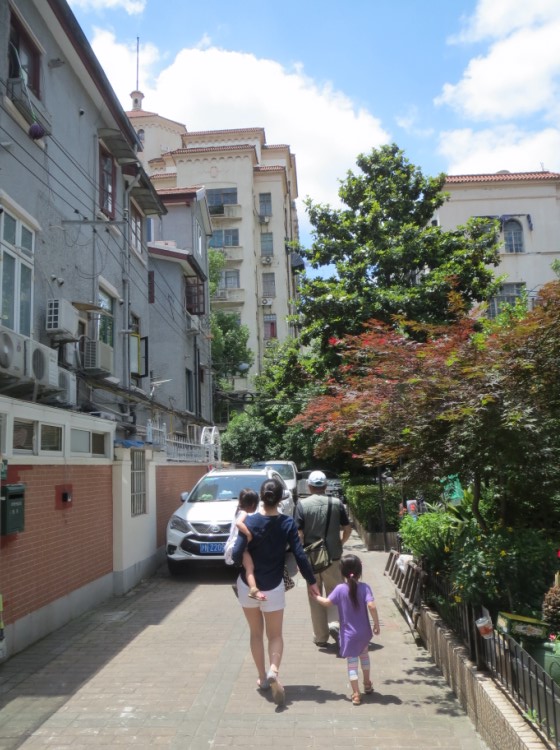
We walked down this alley through a visibly aged but still well-to-do neighborhood
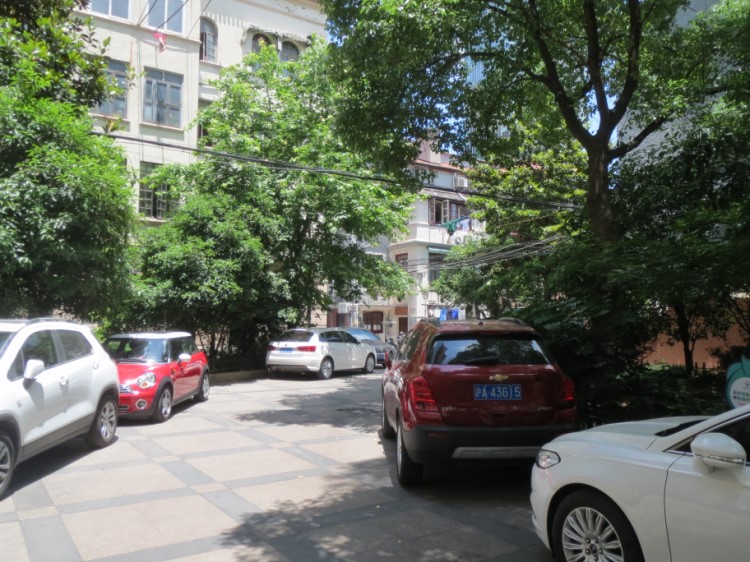
Semi-circular alley in front of the apartment building
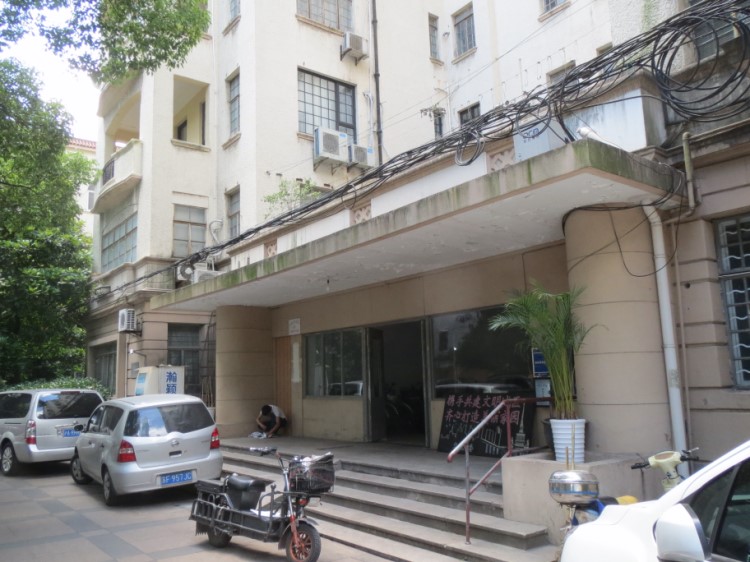
Entrance to the apartment building
While this is now a highly dated residential building, it was a seven-story tower with elevators built over 70 years ago. I’m pretty sure my grandparents had never even seen an elevator until much later. Hong’s dad came from a wealthy Shanghainese family back in the days, and it was possible to see that here. They lived on the top floor in a ~1,500 square-foot unit, with a large balcony for mahjong and room for the servants.
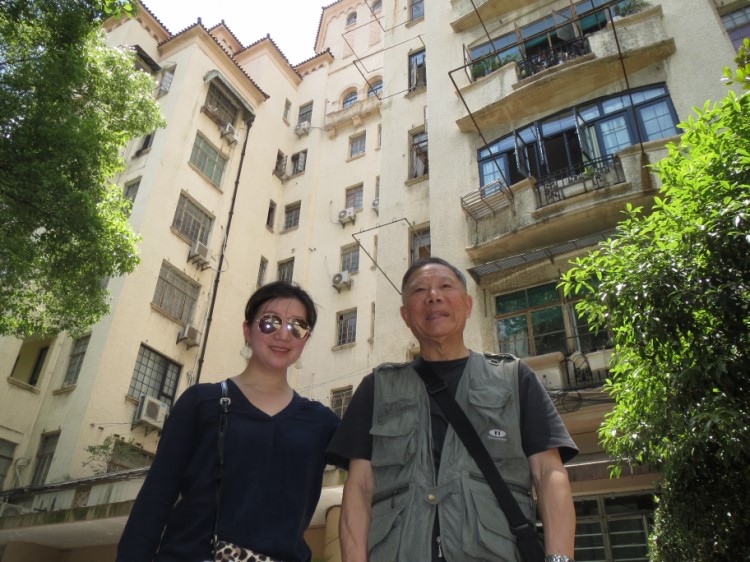
Hong and her dad, in front of his childhood home
Wuxi’s Hou Mansion
I had no interest in visiting Wuxi initially. However, when I found out that my dad (also) had no interest in checking out his dad’s home town, I got agitated. I dragged him and mom here after doing quite a bit of research to learn about the Hou ancestors that had been in this city for hundreds of years. We were apparently one of the largest families in Wuxi.
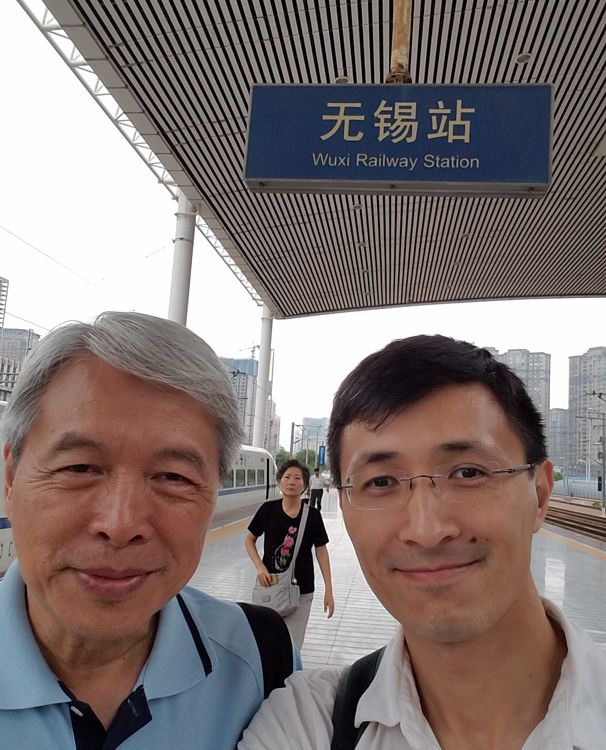
Arriving at the Wuxi station, a bit nervous about what we were gonna find out
Our first stop was the former residence of Hou Tong (侯桐), one of our most famous ancestors in Wuxi. He passed a high level exam and became a big shot government official 197 years ago, hence the ability to afford a mansion. This former residence, according to multiple online sources, was listed as a protected historic landmark but no funding had been allocated for its upkeep. I knew it was not in a good shape, but I still had no idea what to expect.
Its location was on the north side of Renmin Middle Road (人民中路), just west of the Donglin Plaza (東林廣場). The road used to be one of Wuxi’s many canals, called Eight Arrow River (八箭河). The north side of the canal was called 駁岸 – not sure of the significance of the name, but many of the historically significant Hou ancestors dating back 500 years lived in this area.
Finding Hou Tong’s residence was not hard at all… but realizing it still involved an element of surprise. Here’s the entrance to what remained:
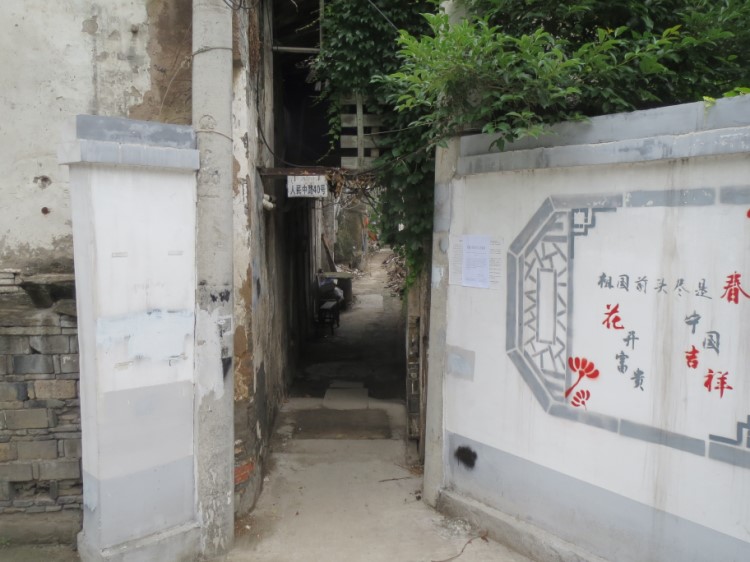
36-40 Renmin Middle Road
An ugly cement barrier had been constructed to wall in the property for some reason. On the inside of that wall, in a pile of trash, we found the sign describing the location’s supposed glory.
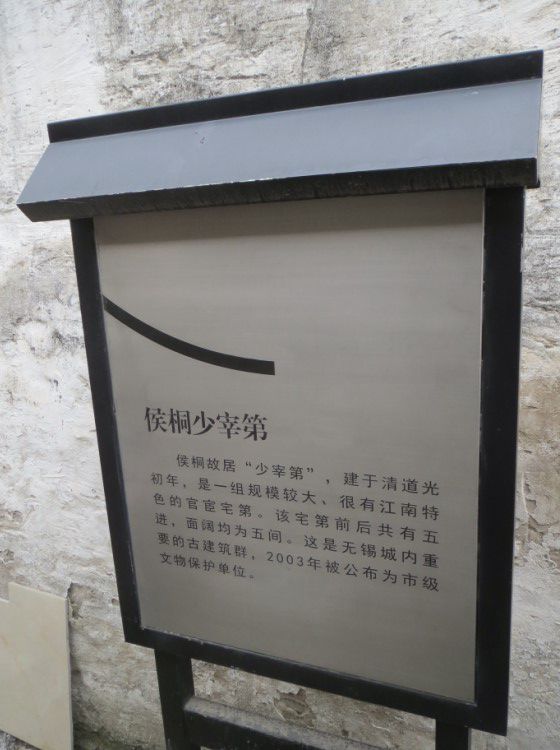
The only indication that what we were not looking at just a dump
Walking into that alley took a bit of House-of-the-Dead courage. I was paranoid about the structure above collapsing (because it actually seemed to be close to coming down). Beyond that were a few houses on either side, each with only two or three remaining walls. The historian in me really wanted to immerse myself as much as possible, but the other parts of my brain were actively warning me about possible rodents, insects, stray animals with diseases, or zombies.
Thankfully none of those things appeared.
It was a strange sight with roof and walls collapsing on household items. How did this happen? Why was there a giant stuffed Santa Claus in relatively good shape? Next to a plastic hair comb? What happened to the previous residents, including the kids who owned those toys? Am I closer in age to them, or to their parents?
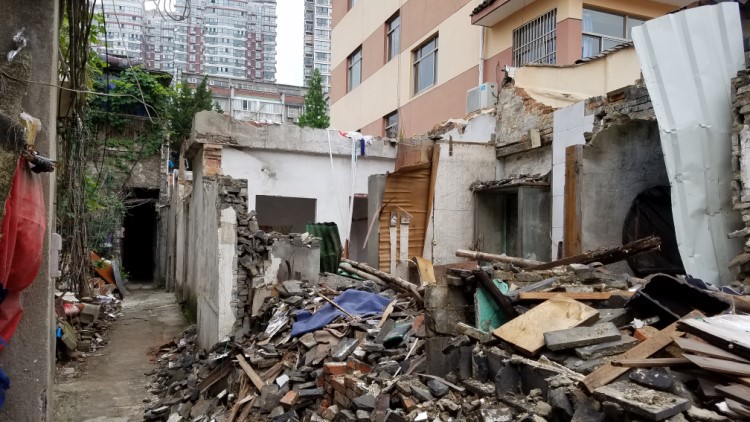
All of this was part of a large mansion at some point, and its owners may have been generations of my ancestors.
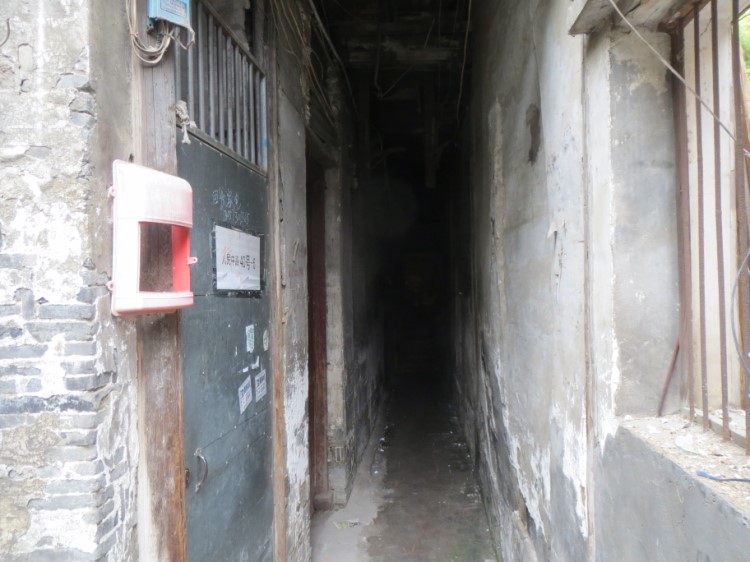
Beyond the rubble was a really dark hallway that just screamed haunted. We took a picture at this end and called it a day…
We left the mansion and explored the nearby neighborhood, which was full of old houses. Some of them were visibly abandoned, while others still had residents. Both kinds, unfortunately, were in a similarly bad shape. My mom, the only chatty one among the three of us, started telling a grandma washing socks on the street that we were looking for the Hou family roots. She responded with the level of warmth and kindness that you expect in an old-time village, in a dialect that I almost entirely could not comprehend. A few other neighbors looked at us curiously, and then an auntie passing by jumped into the conversation. She spoke Mandarin well, was fairly knowledgeable of the neighborhood’s past, and gave us a brief tour. She explained that the Ying Shan River (映山河) we were looking for – an artificial pond that Hou ancestors had in their garden – was now the parking lot that we stood on.
As the nice auntie was ready to say goodbye and go about her own business, she noted that some Hou family members still lived in the Hou Tong residence. Being super helpful, she led us all the way back to where we came from, went straight into that dark “haunted” hallway, and banged on the door (without collapsing the entire building!). While a total stranger herself, she was completely at home and invited us and herself in. She stated our intent for us, in the local dialect, and the house’s owners were happy to have us. We ended up intruding upon some old people’s day and having a tour of their home.
Note: the Hou Tong residence was quite sizable with six levels of depth (進). During the Cultural Revolution, the government let random people come in and rent the units within the first four levels. Those units were left in bad shape. Eventually, for reasons unclear to me, the government came back and knocked those walls down, resulting in the ruins that we saw. The original owners of the mansion, my relatives, were pushed to stay in the fifth level. Most of the family members had moved on since, but these two stuck around waiting hopefully for a government compensation that was promised to them.
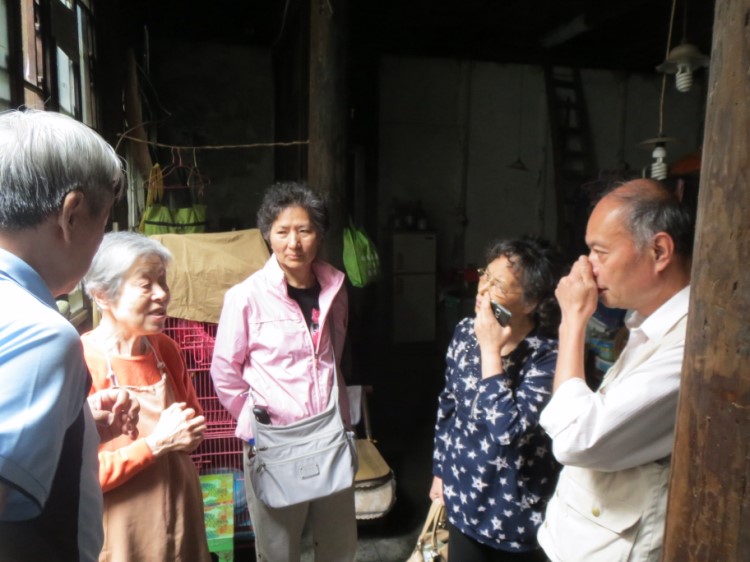
The nice auntie (in blue), the Hou grandma (orange), a Hou uncle (white shirt), and my parents
The conversation about the family’s and the house’s history switched between Mandarin and the local dialect, so my understanding cut in and out
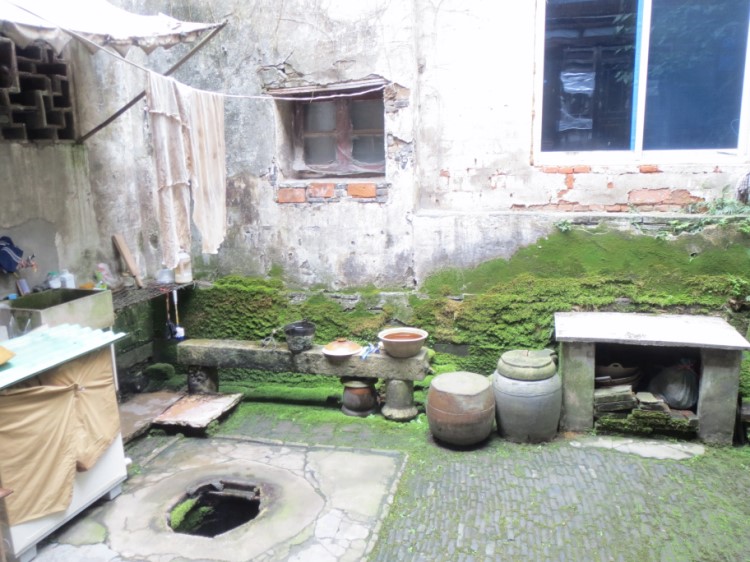
The courtyard within the fifth level (進), with a 200-year-old well that was still used today
What remained of the mansion was unquestionably in a bad shape, and I cringe to think how anyone still lived in it. However, upon closer examination were signs of its faded glory – delicate window carvings, solid wood columns, and a well-polished stone floor. The highlight of the visit, though, had to be the warmth given to us by our distant relatives. We didn’t know each other, and most likely will never see each other again, but they opened their door and welcomed us like family.
I was suddenly missing grandma.
GPS Coordinates of Grandpa’s Home
After leaving the mansion, we strolled through some more historic neighborhoods in semi-ruin, and arrived on Chongning Road (崇寧路). It’s a major street these days, it used to be another canal. The western section of it was called Shi Gu River (師古河). To the east, Six Arrow River (六箭河) connected to water sources outside the city. Grandpa’s childhood home, as well as some other famous people’s, was on Shi Gu River. I tried to imagine these houses, the canal, and the boats that took grandpa and his folks around town. Not a shred of that is left to be seen.
After weeks of triangulating online sources, I pin-pointed grandpa’s childhood home address – 3 Shi Gu River (師古河三號) – to this location.
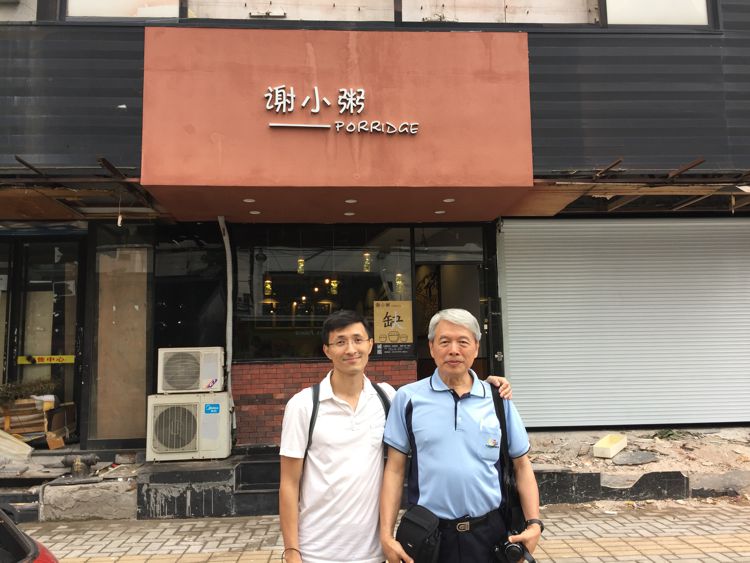
I walked around with that face all day. Hope grandpa liked porridge.
While no direct documentation was available for grandpa’s address, I found references mapping both 1 and 5 Shi Gu River to their present locations. The latter of the two used to be a big Hou family mansion. That family got persecuted during Cultural Revolution. Their books, fabric, etc burned in the courtyard for days, and the lady of the house was forced to stand on a stool to “apologize” for being wealthy. It’s hard not to think about how many of these people may have been important in my beloved grandpa’s life.
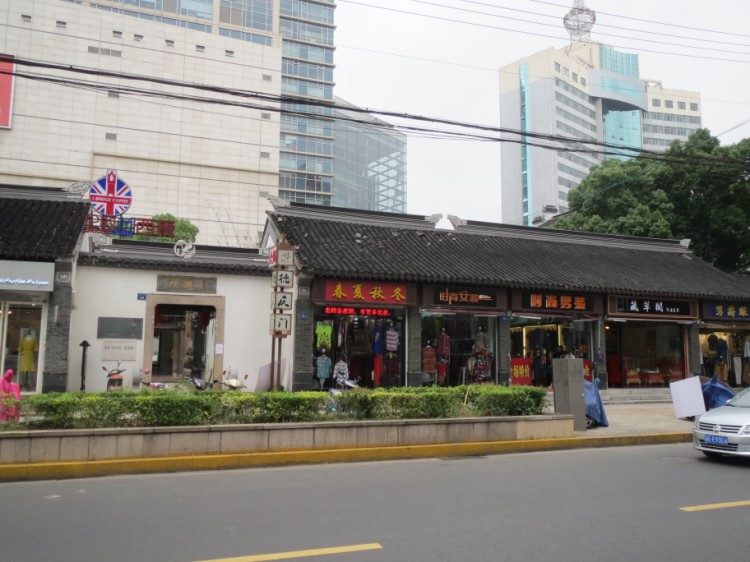
Across the street was another old mansion… that got turned into a shopping complex, ironically including a restaurant with a British flag
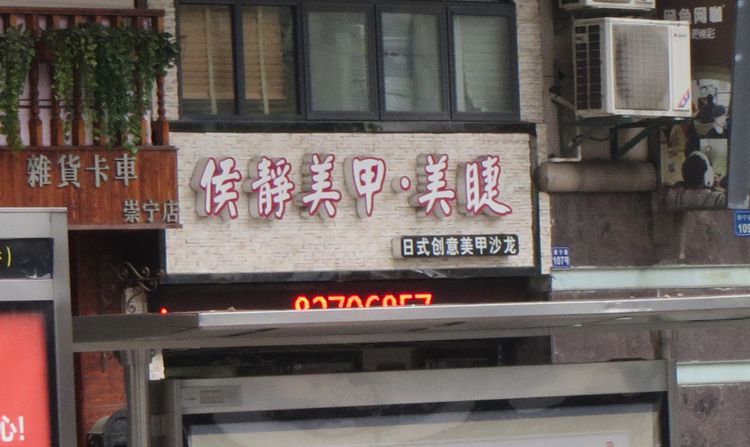
A block over on the same road/canal where my grandpa lived, we found a salon by someone who shared his granddaughter’s name
Also on the same block was a very well preserved mansion, the official former residence of Qin Bang Xian (博古;秦邦憲). Qin is another major family in Wuxi (maybe the largest), and this guy was a founding member of the Chinese Communist Party. Makes perfect sense that his home was now a well-maintained tourist attraction, while my grandpa’s home was gone and Hou Tong’s was in ruins.
Qin and Hou families had been close, with friendship and marriages over generations. Grandpa had some cousins with the last name Qin. Given that this house was only steps away, and that Qin Bang Xian was merely 11 years older, I wondered if grandpa knew this guy personally or may even be related. It’s sad that grandpa’s hometown neighbor was responsible for founding the party that eventually separated him from his home and family.
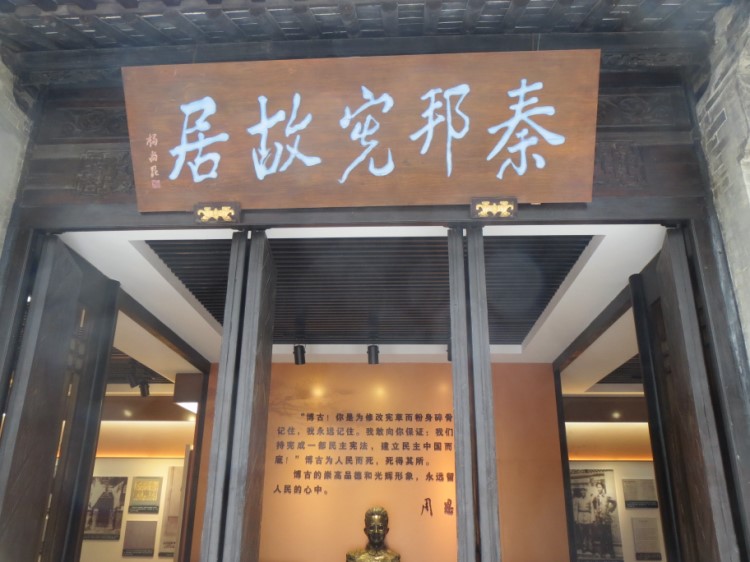
Home of Bo Gu / Qin Bang Xian
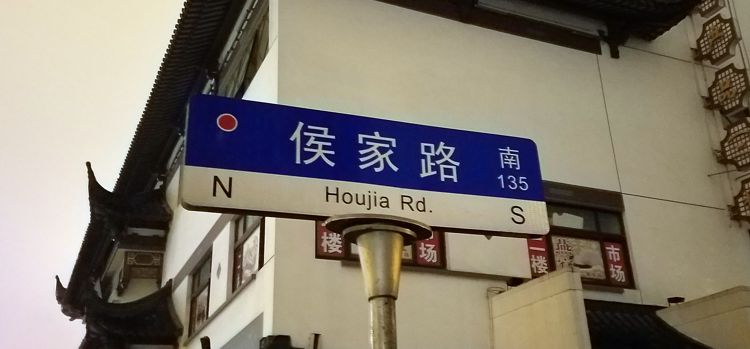
An Inland Beach Vacation (2/8) – Go Go Go – Peter's Blog
June 15, 2017 at 1:38 am[…] A Jiangnan Homecoming […]